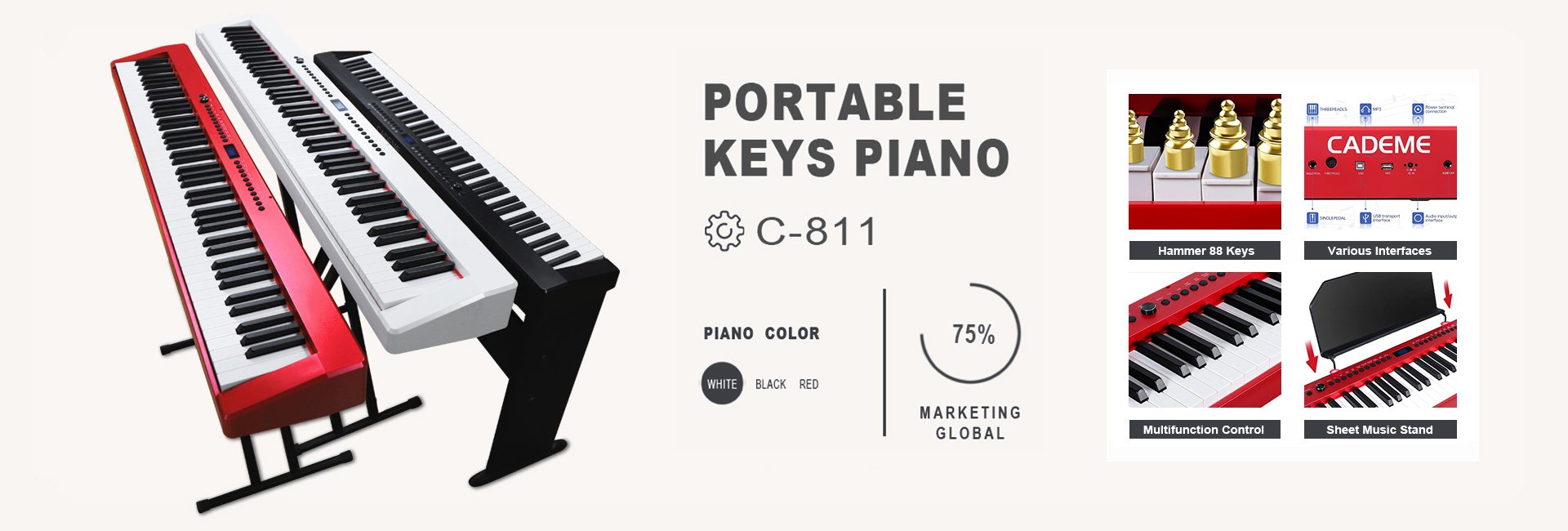Piano keys are an essential component of the instrument, crucial for producing sound. Traditionally, ivory was a prized material for making piano keys due to its durability and aesthetic appeal. However, with growing concerns about environmental conservation and ethical considerations, modern piano keys are predominantly made from synthetic materials.
Historical Use of Ivory in Piano Keys:
In the past, piano keys were commonly crafted from ivory sourced from elephant tusks. Ivory offered a smooth texture, resistance to wear, and a luxurious appearance, making it a preferred choice among piano manufacturers. This practice persisted for centuries, contributing to the decline of elephant populations and raising ethical dilemmas regarding wildlife preservation.
Modern Materials Used in Piano Key Manufacturing:
Today, piano keys are primarily constructed from synthetic materials such as plastic, acrylic, or composite materials. These alternatives provide comparable durability and performance while addressing the ethical concerns associated with ivory harvesting. Additionally, synthetic materials offer greater consistency in production and allow for customization in key design.
Ethical Concerns Surrounding Ivory Use:
The use of ivory in piano keys has sparked controversy due to its association with the illegal wildlife trade and the poaching of endangered species. The demand for ivory has contributed to the decline of elephant populations and threatens the biodiversity of ecosystems. As a result, many countries have implemented strict regulations banning the import and sale of ivory products.
Comparison of Ivory vs. Modern Materials:
While ivory possesses unique qualities such as natural grain patterns and resonance, modern materials offer several advantages in terms of sustainability, affordability, and accessibility. Synthetic keys are less susceptible to temperature and humidity changes, reducing the risk of warping or cracking.
Advantages of Modern Materials:
- Sustainability: Synthetic materials eliminate the need for ivory harvesting, promoting wildlife conservation efforts.
- Affordability: Modern materials are more cost-effective to produce and maintain, making pianos more accessible to a wider audience.
- Durability: Synthetic keys are resistant to chipping, fading, and discoloration, ensuring longevity and consistent performance.
Disadvantages of Modern Materials:
- Sound Quality: Some purists argue that synthetic keys may lack the warmth and depth of tone associated with ivory keys.
- Aesthetic Appeal: While synthetic keys can mimic the appearance of ivory, they may not replicate the exact texture or visual characteristics of natural materials.
Sustainability Factors:
The shift towards sustainable materials in piano manufacturing reflects broader efforts to reduce environmental impact and promote responsible consumption. By embracing alternative materials, the piano industry can contribute to conservation initiatives and mitigate the demand for illegal wildlife products.
Impact on Sound Quality:
While the debate over sound quality persists, advancements in technology have enabled synthetic keys to emulate the acoustical properties of ivory more closely. Additionally, factors such as the piano’s design, construction, and tuning play a significant role in determining overall sound quality.
Maintenance Considerations:
Synthetic keys require minimal maintenance compared to ivory keys, which may require periodic cleaning and conditioning to preserve their appearance and functionality. Routine care and proper storage can prolong the lifespan of piano keys regardless of the material used.
Cost Implications:
The use of modern materials in piano key manufacturing has contributed to cost savings for both manufacturers and consumers. Affordable pricing and reduced maintenance expenses make pianos more accessible to aspiring musicians and enthusiasts worldwide.
Cultural Significance of Ivory in Piano Making:
Despite its controversial history, ivory remains intertwined with the cultural heritage of piano making. Vintage pianos featuring ivory keys hold sentimental value for collectors and enthusiasts, representing a bygone era of craftsmanship and elegance.
Conclusion:
In conclusion, while piano keys were once predominantly made of ivory, modern advancements have led to the widespread adoption of synthetic materials. This shift reflects a commitment to sustainability, ethical stewardship, and innovation within the piano industry. By embracing alternative materials, pianos can continue to inspire creativity and enrich musical experiences for generations to come.
FAQs:
- Are ivory keys still legal to buy and sell?
- In many countries, the sale of ivory products, including piano keys, is highly regulated or banned altogether to protect endangered species.
- Do synthetic keys affect the resale value of pianos?
- While some collectors may prefer vintage pianos with ivory keys, modern pianos with synthetic keys offer comparable performance and durability.
- Can synthetic keys be customized to mimic the appearance of ivory?
- Yes, modern materials can be engineered to replicate the texture, color, and grain patterns of natural ivory for a visually appealing aesthetic.
- Do synthetic keys require special care or maintenance?
- Synthetic keys are generally low-maintenance and resistant to staining or discoloration. Routine cleaning with a damp cloth is sufficient to keep them looking pristine.
- Are there any ongoing efforts to develop more sustainable materials for piano keys?
- Yes, research and development initiatives are underway to explore alternative materials that offer superior performance, sustainability, and eco-friendliness.





